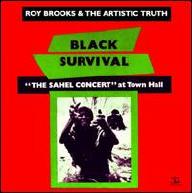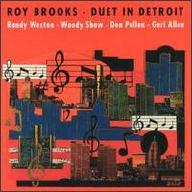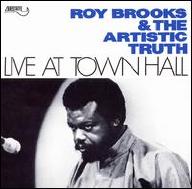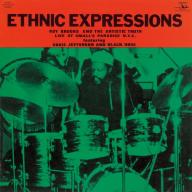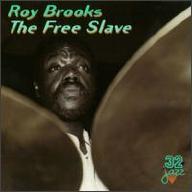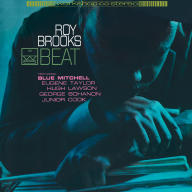Brooks was born in Detroit on March 9, 1938. His earliest musical experiences came from his mother, who sang in church. He began playing drums in elementary school. Despite the fact that Brooks counted Art Blakey, Kenny Clarke, and Joe Jones as his influences, his first idol was then-local drummer Elvin Jones. As a teen, Brooks would often hang around outside the Motor City's famed jazz spot The Blue Bird Inn, where Jones would open the shades and windows to let the youngsters watch. At the time Detroit was home to an astonishing group of musicians. They included Yusef Lateef, Pepper Adams, Barry Harris, Kenny Burrell, Donald Byrd, Paul Chambers, Curtis Fuller, Tommy Flanagan, Louis Hayes, Joe Henderson, Ron Carter, as well as the three Jones brothers, Hank, Thad, and Elvin.
Though he was a varsity basketball star at Northwestern High School, Brooks also played in an after-school pick-up band that included alto saxophonist Charles McPherson, trumpeter Lonnie Hillyer, and future Motown Funk Brother James Jamerson on bass. They attended the daily workshops Harris held at his home. While still attending high school, Brooks worked with Sonny Stitt at the Blue Bird Inn and later played with tenor saxophonist Joe Henderson's quartet at the club. Brooks was awarded an athletic scholarship to the Detroit Institute of Technology but dropped out after only three semesters to pursue music. He joined reed master Yusef Lateef's band (which included Harris) on tour.
In 1959, Brooks' lifelong friend, drummer Louis Hayes and one of three Detroiters in pianist Horace Silver's quintet recommended Brooks as his replacement. The young drummer's taut, fiery, hard-swinging approach was a perfect fit on legendary dates that netted tunes including "Filthy McNasty," "Doin' the Thing," "Song for My Father," "Doodlin'," and "Señor Blues." Still with Silver, Brooks worked on dates by Blue Mitchell, Sonny Red, Stanley Turrentine, Shirley Scott, and others. In 1963, he cut his first headlining date, Beat, which saw release in 1964, the year he left Silver's employ.
Brooks emerged as a fixture on New York City's jazz scene. In August of 1965, he joined Chet Baker's group to record five albums of uncharacteristically physical hard bop in three day-long sessions. Issued by Prestige over the next couple of years, their titles were themed: Smokin' with the Chet Baker Quintet, Groovin' With ...' Comin' On With ...; Cool Burnin' With ...; and Boppin' with the Chet Baker Quintet.
In 1966, Brooks reunited with Lateef, who had left New York some years before, and worked him during his early Impulse! and Atlantic periods. During those years, the drummer also played with Sonny Stitt, Lee Morgan, Charles McPherson, Dexter Gordon, and Milt Jackson. In 1970, Brooks assembled a band of his generational peers including bassist Cecil McBee, trumpeter Woody Shaw, saxophonist George Coleman, and fellow Detroiter pianist Hugh Lawson to record the session that became 1972's The Free Slave on Muse. It is universally considered his masterpiece. That same year he founded Artistic Truth, a band with revolving personnel that included everyone from Eddie Jefferson and Hilton Ruiz to Marcus Belgrave and Sonny Fortune at various junctures; he also became a founding member of Max Roach's Afrocentric percussion ensemble M'Boom and joined James Moody's band. In 1972, Brooks joined Charles Mingus' road band.
Brooks' had long exhibited a flair for theatrics in his performances. He regularly played a musical saw, and also invented an apparatus with tubes that vacuumed air in and out of a drum to vary its pitch (he called a breath-a-tone). He had drum kits custom-made in Italy that led to some of his other percussion inventions. But Brooks displayed erratic behavior and occasionally had on-stage meltdowns that earned him a reputation as a troubled, if supremely gifted player. He wasn't in denial -- he understood what was happening to a degree and on several occasions checked himself into mental health facilities. The Artistic Truth issued their debut, Ethnic Expressions, on Im-Hotep Records, and followed it a year later with Black Survival: The Sahel Concert at Town Hall. Brooks also played on Marcus Belgrave's iconic Gemini II for Detroit's Tribe Records collective. With opportunities diminishing in New York, Brooks returned home to Detroit in 1975, only to find compatible musicians scarce and gigs rare.
After psychiatric diagnosis and treatment, Brooks finally found relief. He spent a few years between 1973 and 1977 recording and touring with South African pianist Abdullah Ibrahim; he recorded Re: Percussions with M'Boom, and played drums in Ruiz's quintet on Excition. In 1978, Japan's Baystate released Artistic Truth's Live at Town Hall from a 1974 gig. He also cut Cadillac Mack with the Detroit Four -- pianist Barry Harris, bassist Vishnu Wood, and trombonist Charles Greenlee -- for Eastworld in Japan. In 1979 he traveled to Tokyo to record the studio set The Smart Set.
In the early '80s, Brooks showcased a new edition of Artistic Truth that appeared regularly at the Detroit nightclub Baker's Keyboard Lounge. With fellow Motor City jazz icons Kenny Cox, Harold McKinney, and Wendell Harrison, Brooks also co-founded M.U.S.I.C. (Musicians United to Save Indigenous Culture), a group supporting aspiring young talent from Detroit's inner-city. Most notably, he also helmed the Aboriginal Percussion Choir, a local group spun out of Roach's M'Boom sensibility. In 1984 he was part of M'Boom's Collage, and played on Roach's self-titled effort for Soul Note. In 1988, Sweden's Heart Note label released the live Nice Mood from a Mingus sextet gig in 1974 with McPherson and Jon Faddis.
Detroit's ever-shrinking jazz scene proved insufficient to keep Brooks afloat financially, and by the early '90s he rarely took his medication, resulting in several outbursts at high-profile gigs. He played on Metro Detroit boogie woogie piano ace Mark Mr. B Braun's live My Sunday Best and Roach's 1992 effort To the Max. In 1993, Enja released Brooks' Duet in Detroit, comprising a series of duets between the drummer and pianists Randy Weston, Don Pullen, and Geri Allen, as well as Shaw, drawn from gigs in the 1980s. It would be the last outing to appear under Brooks' name during his lifetime.
In 1999, Roy Brooks The Improvisational Sphere (a one-off band with Amina Claudine Myers, Ray Mantilla, Jerry LeDuff, and Rodney Rich) performed a triumphant Detroit concert. In 2000, after several felonious assault charges due to his mental illness, he was sentenced to prison, where he spent nearly four years. Upon release in 2004 he entered a nursing home. Brooks died in Detroit on November 15, 2005.
Since his passing, Brooks' catalog has seen sporadic reissues from several sources. The Free Slave has been most consistently in print, but Beat, and the Artistic Truth recordings have also appeared. In 2011, Roy Brooks The Improvisational Sphere on the Sagittarius A Star label appeared, followed by Roy Brooks The Artistic Truth: Live at the Montreux/Detroit Jazz Festival, 1983 in 2012. In 2018, England's BBE released the Charles Mingus archival box set Jazz in Detroit/Strata Concert Gallery/46 Selden with Brooks as drummer during the '70s.
In July 2021, Reel to Real and Resilience Records jointly released the sprawling, multi-disc Understanding. Recorded live, it showcases Brooks leading a band with Shaw, pianist Harold Mabern, tenor saxophonist Carlos Garnett, and bassist Cecil McBee, playing six tunes in a concert lasting more than two hours. The deluxe package included a musicological and historical liner essay by critic and journalist Mark Stryker and an breif introductory notes by producers Cory Weeds and Zev Feldman, as well as interviews with McBee, McPherson, Louis Hayes, and journalist/author Herb Boyd. Proceeds from Understanding benefitted the Detroit Sound Conservancy, a non-profit organization that seeks to conserve artifacts from the city's musical past and to educate the public about its history. ~ Thom Jurek & Jason Ankeny, Rovi
|
1
|
|
Zoltan |
|
2
|
|
Understanding |
|
3
|
|
Soulin' |




